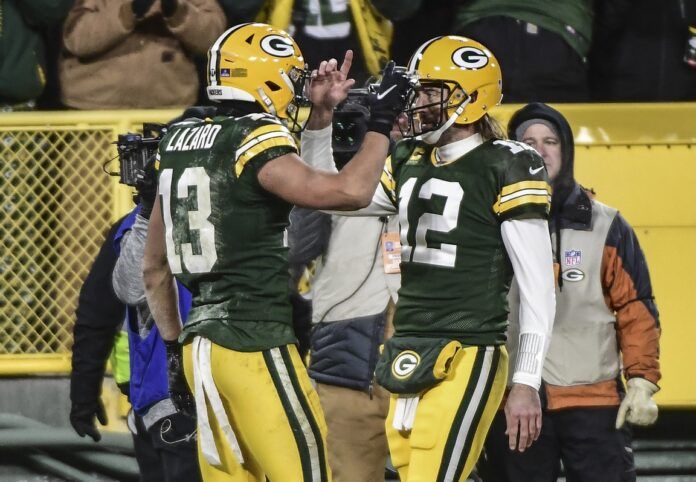The entire NFL knew it was only a matter of time before the Green Bay Packers and New York Jets struck a deal to send Aaron Rodgers to The Big Apple. After 50 days of hand-wringing and negotiations, the looming 2023 NFL Draft spurred to action.
The four-time MVP was traded along with the Packers’ 15th and 170th overall picks in exchange for the Jets’ 13th, 42nd, and 207th overall picks, plus a 2024 conditional second-round pick that can become a first if Rodgers plays 65% of offensive snaps this coming season. The 39-year-old follows in the footsteps of his Green Bay predecessor, Brett Favre, in joining the Jets after an illustrious, Hall of Fame career, with the Packers.
Green Bay will now turn its attention toward building around Jordan Love. But we’re breaking down what this move means for Rodgers and the Jets, and why this deal won’t be a failure.
Why Jets Trade for Aaron Rodgers Can’t Fail
Throughout the NFL’s history, it’s remarkable how certain teams haven’t accidentally found success more often. Whether it’s been the New England Patriots drafting Tom Brady in the sixth round, the St. Louis Rams signing Kurt Warner as a former grocery bagger, or the Miami Dolphins landing Dan Marino with the 27th overall pick, some incredible players have gone far below the radar.
Even Rodgers falls into that category after he was taken 24th overall in the 2005 NFL Draft.
The Jets have repeatedly been one of the most snake-bitten franchises. Even if they’ve been the ones making their own bad luck through poor decision-making, the history of New York’s QB play is telling of the franchise’s struggles. Of the Jets’ top 15 quarterbacks in passing yards, only Chad Pennington has completed more than 59% of their attempts.
Favre and Boomer Esiason were both well past their primes upon joining the Jets. Favre spent only one unremarkable season with New York before forcing his way to Minnesota. Esiason made a Pro Bowl in his first season with the team but produced a 7-19 record over his last two seasons. Joe Namath, Vinny Testaverde, and Pennington are the only passers in franchise history who at least reached mediocrity.
Instead of a flourishing environment, the franchise has become an instant death knell for young and older quarterbacks. Older flameouts litter the crowd of young busts like Zach Wilson, Sam Darnold, Kellen Clemons, Christian Hackenberg, and Bryce Petty. It’s easy to forget stints from Mark Brunell, Mike Vick, Rick Mirer, and Quincy Carter.
MORE: 100% FREE NFL Mock Draft Simulator
Even with Smith finally finding success in Seattle seven seasons after New York drafted him, it’s alarming to see a franchise’s Mt. Rushmore of quarterbacks include Ken O’Brien, Richard Todd, and Mark Sanchez. It’s because of this history that the Rodgers trade simply can’t fail as long as Rodgers plays to his usual level.
The Jets may not get the version of Rodgers who won back-to-back MVPs in 2020 and 2021, even though they have a strong supporting cast and are reuniting him with offensive coordinator Nathaniel Hackett. At his worst, Rodgers is dangerously efficient and careful with the football, boasting the second-best career passer rating of all-time despite ranking 15th in yards per attempt.
His career lows for a full season include completing 60.7% of attempts (2015) for 217.4 yards per game (2022), a 4.2% touchdown rate (2018), and a 2.4% interception rate (2008). The Jets would still see a boost on offense if Rodgers were to replicate career lows in each of those categories at the same time.
While it’s fair to say this trade has the end goal of winning a Super Bowl, it’s really about bringing competence to New York. The Jets have a strong, postseason-caliber roster that will support Rodgers even if he’s just an above-average passer at this point in his career. Retaining a first-round pick in the deal should only help the team make a playoff push.
It’s likely the Jets will surrender a 2024 first-round pick barring an injury that sidelines Rodgers for a significant amount of time. For a staff that lost control of the team at the end of the 2022 season and made changes after losing six straight games, being competitive with Rodgers matters. He won’t fail at reaching the incredibly low bar set throughout the Jets’ history at the position.

